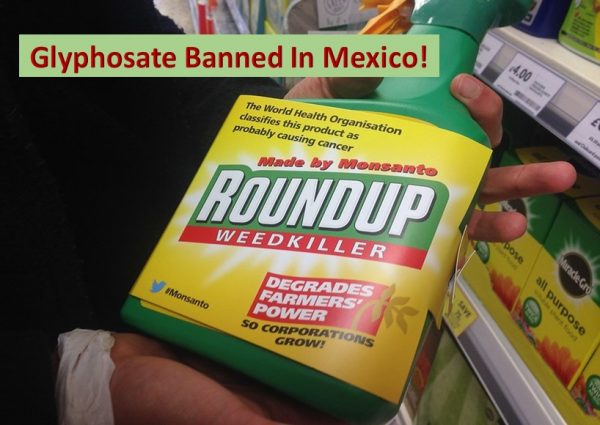
Mexico Bans Glyphosate Herbicide
Glyphosate the active ingredient in Roundup weed killer is banned or restricted not just in one or two but many cities and countries throughout the world. New addition to the existing list is, Mexico. The Mexican Government is working on banning use of glyphosate and planning to be glyphosate free by end of 2024.
Glyphosate is an infamous chemical active ingredient of Roundup herbicide manufactured by Monsanto company. Mexico’s Ministry of Environment and Natural Resources (SEMARNAT) working to free Mexican soil from Roundup contaminants in phases by next four years.
Glyphosate is claiming to cause non-Hodgkin’s lymphoma. Non-Hodgkin’s lymphoma or NHL or sometimes called lymphoma is a cancer that starts in lymphocytes of white blood cells that are part of our immune system. It affects body’s lymph system that helps to fight infections and diseases. Its function is also to help fluid movement through the body and removal of toxins.
Herbicides or weed killers are chemicals that are used in agriculture and sprayed in lawns to kill unwanted weeds. The active ingredient glyphosate present in these weed killers are responsible for the killing of weeds. In United States use of Roundup has caused quite a stir in the courts. In its monograph in 2015, International Agency for Research on Cancer (IARC), published the results of its investigation into the link between cancer and glyphosate. The research working group consisting of 17 renowned scientists from 11 countries concluded that the chemical is ‘probably carcinogenic to humans’ and exposure to glyphosate could cause non-Hodgkin lymphoma.
Since introduction of genetically modified crops, global production of glyphosate has increased dramatically. In USA use of this herbicide rose from 4000 tons (from 1987) to more than 80000 tons in 2007. Residential use of the herbicide has been increases and use of the glyphosate has been registered in more than 130 countries. Now, we can see more reports on presence of the weed killer in soil, surface and ground water. Air and rainwater samples collected in Iowa, Indiana states showed 60 to 100% of glyphosate. Studies conducted on mice by EPA (Environmental Protection Agency) found significant increase in tumors that could link to glyphosate dosage. Study from Farm Family Exposure found that urine samples of farmers showed presence of glyphosate and farmers who did not use rubber gloves had higher concentration of the chemicals. As for the general public, the exposure to glyphosate occurs mainly via food. World Health Organization’s cancer scientists also found strong evidence that formulation of the herbicide containing glycophase are genotoxic.
In India, as of October 2018, the Govt of Punjab banned sale of glyphosate in the state. In 2019, Kerala issued a ban on use, sale and distribution of the chemical. There are several countries – Luxembourg, Malawi, Italy, Greece, Germany, Fiji, France, Denmark, Canada, Brazil, Sweden, Switzerland, UAE, UK – either banned use of glyphosate or several cities, provinces or states banned the use. Sri Lanka was first country to issue a ban on glyphosate. However, due to crop loses and overgrowing weeds, country lifted the ban.
“Beyond productivity, there is human and environmental health” –San Vicente Tello.
According to Minister of the Environment Mexico, Victor M. Toledo, along with glyphosate, Mexico is also banning 111 pesticides that are deemed ‘highly dangerous” for environment. Director general of SEMARNAT primary sector and natural resources Adelita San Vicente Tello revealed that agency is analyzing alternatives for glyphosate.
Image credit: https://www.flickr.com/photos/wdm/26979619191 Global Justice Now IMG_8430 CC By 2.0
About image: Activists have been relabeling bottles of Monsanto’s Roundup weed killer in garden centers and DIY shops across the UK. Roundup contains glyphosate, a chemical that the WHO has shown to be “probably carcinogenic”.
References:
- https://www.baumhedlundlaw.com/
- Organicconsumers.org
- https://weedkiller.personalinjurylawyer.com/
- Healthyholisticliving.com
Author: Sumana Rao | Posted on: August 4, 2020
« COVID-19: Using economic stimulus to reduce the long-term hunger impact FSSAI launches drive against Adulteration in the Edible Oil »






















Write a comment